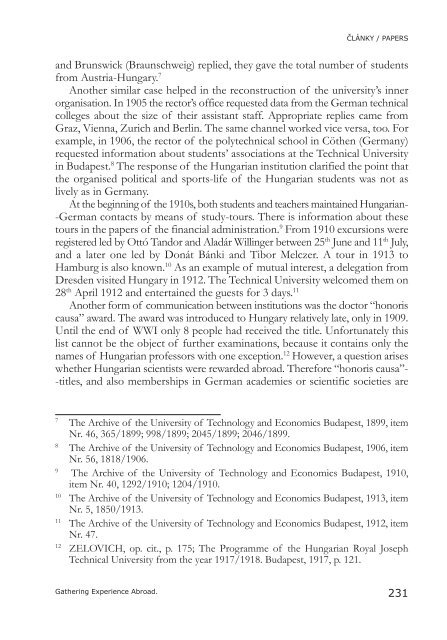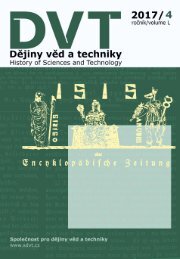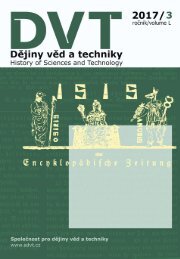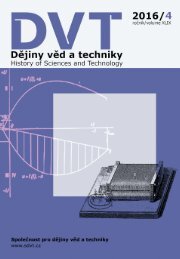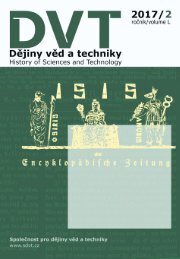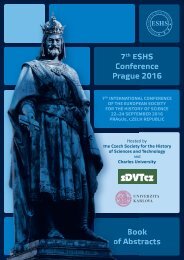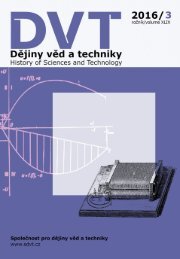Dějiny věd a techniky 2015, 4
Číslo je věnováno 7. mezinárodní konferenci Evropské společnosti pro dějiny vědy, která se konala 22.–24. září 2016 v Praze.
Číslo je věnováno 7. mezinárodní konferenci Evropské společnosti pro dějiny vědy, která se konala 22.–24. září 2016 v Praze.
You also want an ePaper? Increase the reach of your titles
YUMPU automatically turns print PDFs into web optimized ePapers that Google loves.
ČLÁNKY / PAPERS<br />
and Brunswick (Braunschweig) replied, they gave the total number of students<br />
from Austria-Hungary. <br />
Another similar case helped in the reconstruction of the university’s inner<br />
organisation. In 1905 the rector’s office requested data from the German technical<br />
colleges about the size of their assistant staff. Appropriate replies came from<br />
Graz, Vienna, Zurich and Berlin. The same channel worked vice versa, too. For<br />
example, in 1906, the rector of the polytechnical school in Cöthen (Germany)<br />
requested information about students’ associations at the Technical University<br />
in Budapest. The response of the Hungarian institution clarified the point that<br />
the organised political and sports-life of the Hungarian students was not as<br />
lively as in Germany.<br />
At the beginning of the 1910s, both students and teachers maintained Hungarian-<br />
-German contacts by means of study-tours. There is information about these<br />
tours in the papers of the financial administration. From 1910 excursions were<br />
registered led by Ottó Tandor and Aladár Willinger between 25 th June and 11 th July,<br />
and a later one led by Donát Bánki and Tibor Melczer. A tour in 1913 to<br />
Hamburg is also known. 10 As an example of mutual interest, a delegation from<br />
Dresden visited Hungary in 1912. The Technical University welcomed them on<br />
28 th April 1912 and entertained the guests for 3 days. 11<br />
Another form of communication between institutions was the doctor “honoris<br />
causa” award. The award was introduced to Hungary relatively late, only in 1909.<br />
Until the end of WWI only 8 people had received the title. Unfortunately this<br />
list cannot be the object of further examinations, because it contains only the<br />
names of Hungarian professors with one exception. 12 However, a question arises<br />
whether Hungarian scientists were rewarded abroad. Therefore “honoris causa”-<br />
-titles, and also memberships in German academies or scientific societies are<br />
<br />
The Archive of the University of Technology and Economics Budapest, 1899, item<br />
Nr. 46, 365/1899; 998/1899; 2045/1899; 2046/1899.<br />
<br />
The Archive of the University of Technology and Economics Budapest, 1906, item<br />
Nr. 56, 1818/1906.<br />
<br />
The Archive of the University of Technology and Economics Budapest, 1910,<br />
item Nr. 40, 1292/1910; 1204/1910.<br />
10<br />
The Archive of the University of Technology and Economics Budapest, 1913, item<br />
Nr. 5, 1850/1913.<br />
11<br />
The Archive of the University of Technology and Economics Budapest, 1912, item<br />
Nr. 47.<br />
12<br />
Zelovich, op. cit., p. 175; The Programme of the Hungarian Royal Joseph<br />
Technical University from the year 1917/1918. Budapest, 1917, p. 121.<br />
Gathering Experience Abroad.<br />
231


